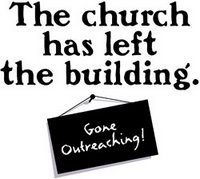
Dave Livermore, M.A., was senior pastor of the Kelso-Longview Community Seventh-day Adventist Church, Kelso, Washington, United States. He doesn't hate evangelism. Here's why. Taken from Ministry Magazine October 2006.
It's Sunday morning, and I am watching a riveting football game. One team dominated the other during the first half. But in the second half, the other team made so many good adjustments that it took the lead-and eventually won the game. What can we, as a church, learn from that second-half comeback victory?
The problem
First, I'm sick of what the devil does to our communities-the crime, the drugs, the broken homes, and the vacant stares on so many faces. When we look to the church as a place of hope, a place where questions can be answered and where life can begin anew, we often see independent attitudes, critical spirits, divided efforts, a relative morality, and a holiness that's often very unappealing. To go back to my football analogy, according to the scoreboard, we are losing the game.
Let's pretend it's halftime. What adjustments must the Seventh-day Adventist Church make that can turn our "team" around to have a greater impact on our communities? Plenty. But first, if you're in the locker room at halftime, you must give full attention to the coach. Jesus, the Coach, has mandated our mission: "Therefore go and make disciples of all nations, baptizing them in the name of the Father and of the Son and of the Holy Spirit, and teaching them to observe everything I have commanded you. And surely I am with you always, to the very end of the age" (Matthew 28:19, 20, NIV).
The personal approach
Some believe that public evangelistic series have become costly and largely ineffective. Many pastors have given up on them entirely. I've heard about pastors holding an evangelistic series, and no community people came. "Well, these meetings are good for the church too," they say in response. Maybe that's true, but that's not why we hold evangelistic meetings. The church is not the target. The community is. Some also believe that, because evangelistic series are not working well in some countries, people are not interested in our last-day message. That's simply not true! I believe that the Seventh-day Adventist Church will not grow without public evangelism.
I'm convinced that the church I pastor will not grow without public evangelism. We have done an evangelistic series each of the last nine years, and I know that we must, all year long, plow ground, plant seeds, and fertilize the soil. This crucial adjustment will focus the church in a direction that leads toward a successful evangelistic series. Our "Coach" set the example: "Christ's method alone will give true success in reaching the people. The Saviour mingled with men as one who desired their good. He showed His sympathy for them, ministered to their needs, and won their confidence. Then He bade them, 'Follow Me.' " (Ministry of Healing, 143)
No amount of handbills or literature hung on a doorknob will ever take the place of one-on-one contact. As we make friends for friends' sake, as we participate in community picnics, as we visit over our fences in our neighborhoods, as we have opportunities to pray for troubled family and friends, we win their confidence and people feel and see our sympathy. We earn the right to speak further to their hearts, and then we can invite them to a small group designed only to deepen that relationship (small groups like those with which I am familiar, such as Marathon Madness, Monday Night Football, Your Best Life Now, Intimacy Issues,Knitting Together, Learning Spanish, Marriage Matters, Doing Community Surveys, Personal Devotions, Creationism, etc.).
Our small groups don't need to do anything more than just make friends. One of our small group leaders tells me, "I'll provide the friendship, relationship, and foundational studies; then I'll bring them to the evangelistic series, and you, Pastor Dave, take them the rest of the way." Just make friends. If you do, the opportunity to invite them to a series will become natural.
A new model
Adjustments can make a big difference. For instance, this year we realized that it was a stretch to expect community people to come to an evangelistic series for 17 or 19 nights. I love to play golf; but I could not attend a series of rounds of golf for 19 nights at any time during the year, including summer, no matter how much I might want to, because I'm just too busy. Our community people are too busy and, likewise, the church family. What, then, can we do to make it easier for them to come to a series? Acts 15:19 (NIV) says, "It is my judgment, therefore, that we should not make it difficult for the Gentiles who are turning to God."
How did we make it easier? First, we prepared throughout the year. Then, and here's where we made some adjustments, we had three weekend meetings. That's it. That was our evangelistic series. On opening night, a Friday evening, two sermons were preached: no preliminaries, no music, no theme song, nothing other than a warm welcome, snacks on the tables, an explanation of child care, and a short preview of what will happen the next night. The two sermons were preached by two different speakers--I opened with "Signs of His Coming," and our associate closed the first night on "How Jesus Returned." We invited everybody back to church the next morning, when I spoke on Daniel 2 for the Sabbath worship service. We fed everyone dinner each Saturday evening, with many community friends in attendance. Throughout the series, we had 115 community people participate in our effort.
Our second night began with dinner at 6:00 P.M., followed by two more sermons that began at 7:00 and ended by 8:30. We used three speakers because we found in using a multiteaching staff that people connected to the message better than connecting to the messenger, as can be a problem if we use a guest evangelist. We covered fifteen topics in those three weekends, including our Sabbath services.
After we completed the three-weekend series, we formed a new Sabbath School for our community friends and for members who had formed relationships with them. Here we covered additional teachings and then immediately moved into a program called "In the Footsteps of Paul." As a result, we have baptized or have accepted by profession of faith 25 people so far this year. Because of those who haven't made a decision yet but who continue to stay with us, we finished "In the Footsteps of Paul" and moved them into a Sabbath School class taught by our Bible worker. Now they are studying through our fundamental beliefs, and we will make several appeals through the next 24 weeks for them to take the next step in their Christian experience.
A simple adjustment, a transformed church
When these community people know who Seventh-day Adventists are, something powerful happens to the church. Everybody comes to life; the church takes on a whole new flavor with a new atmosphere pervading the foyer that then flows into the worship center. You can find energy and expectation in the kitchen, at potlucks, and in the restrooms! It permeates the church, and the culture that once was inward focused, now, through an adjustment, becomes what God would have it be: outward focused. All this because guests have arrived, and we planned in advance to treat them as Christ treated guests.
A simple adjustment, that's all. And things came back to life. I think our "Coach" is calling for a new play: same team, same rules, but a new strategy. It's halftime, and He's calling for an adjustment in the game plan. Will we keep doing what we've been doing and have a second half as moribund as the first? Or shall we come out after halftime with a new attitude and with a new aggressiveness after adjustments have been made?








